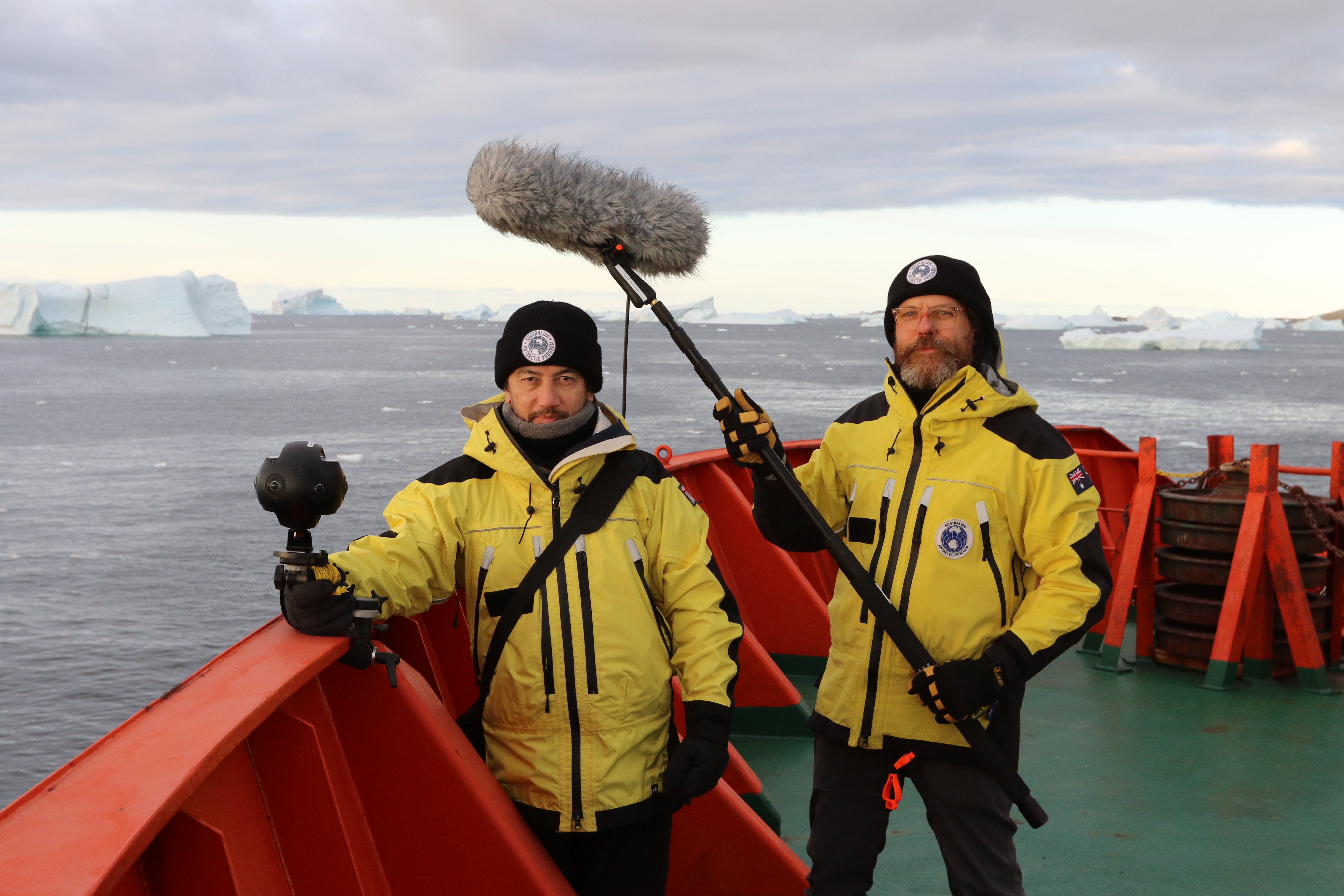Reliving RSV Aurora Australis’ last voyage to Antarctica in VR

Dr John McCormick (left) and Dr Adam Nash (right) started to create Aurora Australis Ultimo Choro during a once in a lifetime trip to Antarctica in early 2020.
In summary
- Swinburne’s Dr John McCormick and fellow digital artist Dr Adam Nash from RMIT were awarded the 2020 Australian Antarctic Arts Fellowship
- Dr McCormick immortalised his journey to Antarctica in early 2020 through virtual reality (VR) art, showing as part of Swinburne and ACMI’s next gen_now exhibit
- The VR experience at ACMI, ‘Aurora Australis Ultimo Choro’, depicts the final Australian voyage of the icebreaker RSV Aurora Australis to the Antarctic continent
A stunning virtual reality experience of the final Australian voyage of the icebreaker RSV Aurora Australis to the Antarctic continent is part of the ‘next gen_now’ exhibit, a Swinburne/ACMI collaboration showing from 7–13 August.
‘Aurora Australis Ultimo Choro’ was created by Swinburne’s Dr John McCormick and fellow digital artist Dr Adam Nash from RMIT. They spent six weeks aboard the Aurora Australis in early 2020 after being awarded the Australian Antarctic Arts Fellowship.
For ‘Aurora Australis Ultimo Choro’, Dr McCormick and Dr Nash use laser scans of the ship, crew and expeditioners to present a VR experience depicting the intricate choreography of the ship and its expeditioners.
‘The voyage was an incredible experience and I was extremely lucky to have been part of something so historical,’ says Dr McCormick. ‘It was a case of seeing more and more amazing things every day.’
The expedition left Melbourne in January 2020 with the smoke of bushfires still hanging over the city and returned just as COVID-19 pandemic began to take hold.
As well as creating ‘Aurora Australis Ultimo Choro’, the pair’s documented the voyage including the ship, crew, expeditioners, and science and data collection. They did this with laser scans, aerial drone recordings, 360-degree video, ambisonic sound, high-definition video and photos. The pair are continuing to create artworks to depict the once-in-a-lifetime experience.
The VR experience shows the incredible environment as well as the people involved, their shared passion and commitment, and the interdependency of everyone aboard.
Dr McCormick and Dr Nash underwent a week of solid training before departing, instilling survival and safety skills, and building a sense of camaraderie essential for life in the tight-knit ecosystems of ship and stations.
The trip served as the summer resupply voyage, delivering provisions and fuel to the stations, and exchanging expeditioners . ‘Antarctica is as majestic as you can possibly imagine it to be. The scale is hard to grasp. It is difficult to comprehend the enormity of the icebergs, the glaciers, the Southern Ocean, the aurora australis filling the sky. But contemplating that even such enormity is fragile is very saddening. With ‘Aurora Australis Ultimo Choro’ we have developed an artistic experience depicting life in the microcosm that is the last dance of the Aurora Australis,’ says Dr McCormick.

Dr John McCormick is a senior lecturer in Interactive Media at Swinburne, teaching virtual production, augmented reality and virtual reality . He also works as a researcher in the Centre for Transformative Media Technologies, researching robotics, extended reality and contemporary art expressed through technology.
'Aurora Australis Ultimo Choro' is open to the public at ACMI from 7–13 August.
Following the latest advice from the Victorian Government, ACMI will be temporarily closed from Friday 6 August. Unfortunately, next gen_now is postponed.
Swinburne and ACMI look forward to rescheduling this event showcasing exciting digital experiences, films, games and art. Check the ACMI website for updates.
-
Media Enquiries
-

- Astronomy
‘Beyond what’s possible’: new JWST observations unearth mysterious ancient galaxies
A paper published in Nature details findings using new data from the James Webb Space Telescope challenges our understanding of how galaxies form.
Thursday 15 February 2024 -

- Science
Quantum research sheds light on the mystery of high-temperature superconductivity
An international team of scientists have made a new discovery that may help to unlock the microscopic mystery of high-temperature superconductivity and address the world’s energy problems.
Thursday 08 February 2024 -

- Technology
- Science
- Sustainability
- Engineering
CSIRO and Swinburne invest in green steel and mineral processing to help industry get to net zero
CSIRO and Swinburne have established a new partnership to tackle global decarbonisation with innovative green steel and mineral processing research and development.
Thursday 01 February 2024 -

- Technology
- University
Innovative approaches to teaching and learning funded by Adobe
A total of 10 diverse projects dedicated to improving the digital literacy of our students have been awarded Adobe Innovation Grants and Curriculum Innovation Program.
Wednesday 31 January 2024 -

- Astronomy
- Science
Dark energy discovery a decade in the making: new supernova insights offer clues to the expansion of the universe
Researchers at Swinburne University of Technology have contributed to a landmark study that complicates our understanding of the universe.
Thursday 11 January 2024

